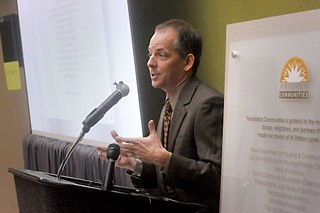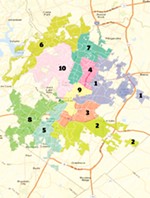Wrangling Over Housing Tax Credits
Travis County Commissioners to revisit a housing finance scheme
By Elizabeth Pagano, Fri., March 29, 2013
Few people would claim that getting subsidized housing built in Texas was ever easy. But in the wake of a failed $78.3 million affordable housing bond proposal, the fight to build new affordable housing in Austin has become downright scrappy.
Throw in new rules from the state that have local governments delving into the complicated realm of federal tax credits for the first time, and you pretty much have a complex mess.
This was certainly the case last week at the Travis County Commissioners Court, when the county decided to take a second look at its decision to endorse two projects that were seeking 9% tax credits. Though the credits are federal, they are distributed by the state in a competitive process that is broken down by region. Each project is assigned points based on various criteria, and the projects that get the most points are awarded the tax credits, which then end up financing the majority of the project. The local endorsements, which now must be submitted by local governments, account for just over 10% of the scoring.
Last month, the city of Austin set aside a hefty chunk of the budget surplus for six projects in the city, with the understanding that only two would be financed. Because the tax credit competition is so fierce, only two from our area – Region 7 – are expected to receive this kind of financing.
But then, just two weeks before the applications were due at the state, the County Commissioners were presented with a deal that seemed too good to pass up. Not only would they be able to help build more affordable housing in the county, but it would be at no financial risk for them.
The concept was simple, the plan convoluted. Travis County would secure a line of credit at the bank. Then, if either developer were successful in securing tax credits, they would provide collateral to the bank. That money would go to the county, which would, in turn, make that loan to developers. "The assumption was that this was a leveling of the playing field, that we would offer it to anyone that would ask, and no one else was asking because nobody else needed it, and it wouldn't affect anyone else," explains County Commissioner Sarah Eckhardt."It came to light after the fact that actually there were some unintended consequences of what we were considering."
In fact, the county-endorsed projects presented a real threat to the city-endorsed projects, including two assumed front-runners proposed by Foundation Communities. When that organization's executive director, Walter Moreau, went to check on the standing of his two projects, he saw that one had been knocked out of contention, at least for the present. Foundation Communities' Homestead Apartments, which proposes 138 units of affordable housing at 3226 W. Slaughter Ln., was pushed to third place, edged out by the 120-unit Windy Ridge Apartment homes, which Realtex Development Corp. is hoping to build off of RR 620.
Moreau was stunned. Focused on his own two projects, he had no idea that the two other projects would eke out a county endorsement. Otherwise, he explained, he would have certainly testified that the scheme wasn't fair.
"Nobody understood it. I think they went to the [county] judge and said we have a deadline, this is super, super, super safe, there's just no risk involved here, and it helps us build some affordable housing. They didn't explain that, from my perspective, the loan is not ethical," said Moreau. "The state rules are really clear. The funding from the city or the county cannot come from the developer. The developer can't give the money to the county first, and then have it go back to them. ... They are basically laundering the money through Pioneer Bank."
Advocates of the county-endorsed projects disagree. They say that the collateralized loans are a means of balancing the scales, putting economically disadvantaged counties on level ground with wealthier municipalities. Of course, with a county tax base that is largely shared with the city, and a constituency that includes those who live in Austin, it's not the easiest argument to apply to Travis County.
Cynthia Bast, a law partner at Locke Lord and representative of the Windy Ridge project, says the structure of the loan is "certainly appropriate," something that has been done by jurisdictions across Texas, and something that the Texas Department of Housing has known about for years. She explains that, without ways to level the playing field, areas that "don't have a big pot of money sitting around as a resource" would be excluded from the financing as a matter of routine. "Mr. Moreau can have notions about what is real funding or what is not real funding, or what is right or wrong, but the point is: There is a body of rules. ... The law had a certain intent. The law has been implemented by a body of rules; there's a body of rules that permit this," says Bast.
At this point, the county has not obligated itself to create a loan program and has yet to negotiate the terms of the loan. And county officials are waiting to hear back from the state about whether the current plan is legal. (They intend to revisit it in the next couple weeks, regardless.)
If they go forward as is currently planned, Moreau has said that he will protest the scheme to the state – unless the county puts real money behind its endorsement. And now that the full impact of the plan is understood, Eckhardt says that she agrees with that position. But now that the stakes are clear, she said she also has some research to do. "They are good projects," says Eckhardt. "But I can't say that I've done the due diligence to say that of all the projects within Travis County, these would be the two that I would want to add Travis County weight to."
Got something to say on the subject? Send a letter to the editor.











